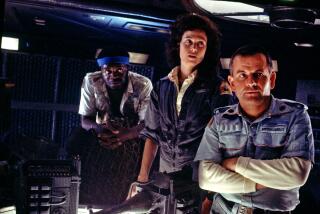‘Alien’ shares a political strain with ‘Andromeda’
- Share via
The excellent “Alien” reminiscences by Manohla Dargis (“Return to the Nostromo”) and Lewis Beale (“Influential ‘Alien’ Probed Culture’s Darkest Fears”) on Oct. 29 barely touched on the most significant fright at the core of the film: fear of the military-industrial complex.
While the Nostromo’s crew members were revolted on seeing Young Alien bursting like pinata candy from John Hurt’s chest, their biggest moment of sheer disgust came with the realization of their true uber-mission: to scoop up any alien life form that might be militarily useful. Their real enemy wasn’t merely an “owner-boss,” but rather the Weapons Division of the omnipotent Company that employed them. (I personally found the image of the Company’s “mole” -- the android Ash, played by Ian Holm -- speaking via a disembodied head gurgling Mocha Mix as disturbing as any in the film.)
That “enemy is us” motif owes less to earlier outer-space movies than it does to an often overlooked science-fiction film of the 1970s that was even more intelligently presented than “Alien.” In fact, the plot line of “Alien” very neatly follows that of this predecessor: bickering crew in an isolated setting ... deadly alien entity brought back from space ... just when the crew thinks they’ve got it licked, the entity mutates ... a disturbing realization that the protagonists are pawns in a government scheme to use this alien killer for its own military purposes ... and a final, edge-of-the-seat countdown intoned by an impassive female voice as the crew’s independent-minded loner struggles to halt a self-destruct mechanism.
That film was “The Andromeda Strain,” and watched back-to-back with “Alien,” the parallels become apparent. (Talk about scooping up out-of-this-world baddies: The government project that set this film’s crew into action was named “Operation Scoop.”)
The genius of “Alien” was in taking a faceless space-virus and turning it into a thing-that-goes-bump-in-the-night. But for a more relevant culprit in today’s world, it’s hard to beat “Andromeda Strain’s” bioterror from beyond, as envisioned by Michael Crichton in both his novel of the same name and his co-written screen adaptation. (Hey, you want a weapon of mass destruction even Saddam couldn’t dream of, check out the gunk floating 250 miles up!)
Meanwhile, for director Robert Wise, it was a return to sci-fi with political overtones, an arena he toiled in so compellingly two decades earlier in “The Day the Earth Stood Still.” These two films, out of Wise’s small handful of science-fiction efforts, neatly bracketed two decades of political paranoia. Fear of the other was the threat in 1951’s “Day” playing on our perceived fears of the nuclear gamesmanship we were playing with the Soviets. By 1971, when “Andromeda Strain” was released, we were halfway through the Nixon administration and the horrors of our own government struck a more foreboding chord.
Ironically, locking it into the fears du jour roots “Andromeda Strain” in its time, whereas, as Beale pointed out, Ridley Scott made “Alien” the template for countless science-fiction horror films to come.
Yet “Andromeda Strain’s” cautionary tale makes it the more resonant film. Are we truly afraid of a monster coming back from a space trip? Probably not in this century.
Do we have any doubts that our government would capture and explore an extraterrestrial virus that could make anthrax look about as threatening as Classic Coke? Hmmmmm.
Morgan Gendel has served as a writer-producer on such television series as “Law & Order,” “Nash Bridges” and “V.I.P.” He received a Hugo Award for his teleplay for the “Inner Light” episode of “Star Trek: The Next Generation.” He lives in Westwood.
More to Read
Only good movies
Get the Indie Focus newsletter, Mark Olsen's weekly guide to the world of cinema.
You may occasionally receive promotional content from the Los Angeles Times.










